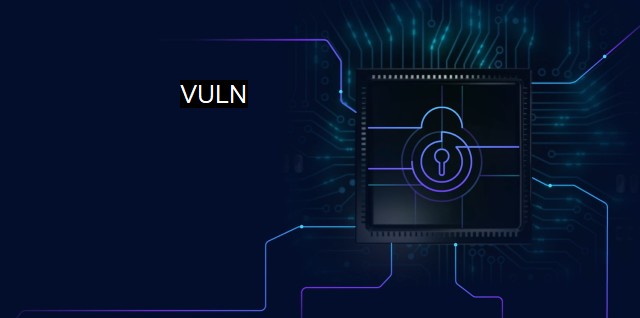What is VULN?
Understanding the Significance of VULN in Cybersecurity: Identifying Software, Hardware and System Vulnerabilities for Antivirus Protection
A term often encountered in the fields of cyber security and anti-virus software design is "VULN". Predominantly used as shorthand for "vulnerability," this term refers to any sort of weakness in a computer system, network, or format of digital operations that can be potentially exploited by online attackers or hackers. With growing technology and increasing dependence on digital systems and online networks, identifying and addressing these vulnerabilities is essential.a VULN provides the entry point for an attacker to infiltrate a system, draw data, extract crucial information, disrupt functionalities, or spread malicious software like viruses or Trojans. Every digital system, web-based application, or network has vulnerabilities that can be identified and exploited. Both large organizations and individual users are at risk of any potential exploitation of these vulnerabilities. Hence, the role of cyber security and antivirus protection has become an essential part of maintaining personal and sensitive data's integrity.
Vulnerabilities synonymous with VULN can arise from a variety of sources. Primarily, they can occur due to flaws in the software or an operating system. Programming and coding errors can create backdoors that attackers can manipulate to gain access to the system. An outdated software or system with unresolved technical bugs can give opportunities to hackers to exploit these VULNs. weak passwords and insecure network protocols can also amount to vulnerability, as it makes it easier for attackers to infiltrate the system and potentially lock out legitimate users.
Not all vulnerabilities have to be technical or software related. Those that concern human factors, referred to as 'social engineering exploits,' occur due to behaviors, lapses in judgment, or simply, human error. Misleading emails (phishing), scam calls (vishing), or manipulative information leading users to insecure websites are some methods via which attackers seek to exploit these VULNs in the system.
From a cyber security or antivirus perspective, the primary goal is detecting these vulnerabilities and patching them to make the system secure. Penetration testing is one of the methods widely used where ethical hackers (termed ‘white hat’ or ‘pen-testers’) intend to exploit the VULNs to identify how and where a system is weak. These are simulated attacks which provide an understanding of how real attacks can potentially happen later.
Another crucial aspect of combating VULN threats is the process of constant updates or patches. Software developers constantly release updates for their software to address newly discovered vulnerabilities. Yet the significance of this process is often undervalued by users resulting in outdated systems or lapses in security. In light of all this information, it is important that both organizations and individual users remain steadfast in their cyber vigilance to protect themselves.
Even the best anti-virus software or cybersecurity measures can only minimize the risk of a VULN being exploited, not eradicate it. An all-round approach, which maintains updated hardware and software, utilizes strong and unique login credentials, regular backups, and suspicious behavior recognition, in combination with a quality antivirus or anti-malware solution, can help keep systems secure against an increasing threatscape.
The term 'VULN' is a critical element in the realm of cybersecurity and antivirus software protection. Recognizing these vulnerabilities and taking measures to counteract them forms the base of cybersecurity strategies aimed at safeguarding information and maintaining integrity in increasingly how online connectivity is embedded into our everyday lives.

VULN FAQs
What is a vuln in cybersecurity?
In cybersecurity, "vuln" is a slang term for vulnerability, which is a weakness or flaw in a system or software that can be exploited by a hacker to gain unauthorized access or conduct a cyberattack.Why is it important to protect against vulns?
It is important to protect against vulns because they can put your personal and sensitive information at risk, compromise the security of your network or device, and lead to financial loss or damage to your reputation.How can antivirus software help protect against vulns?
Antivirus software can help to protect against vulns by detecting and blocking malicious software or code that may exploit vulnerabilities in your system or software. Many antivirus programs also offer real-time protection and automatic updates to help keep your system secure against emerging threats.What should I do if I discover a vuln in my system or software?
If you discover a vuln in your system or software, you should immediately report it to the vendor or developer, who may offer a patch or update to fix the issue. You should also take steps to protect your system by installing antivirus software, updating your software regularly, and practicing good cybersecurity hygiene such as using strong passwords and avoiding suspicious emails and links.Related Topics
Vulnerability Scanning Vulnerability Management Penetration Testing Intrusion Detection and Prevention Cyber Threat Hunting
| | A | | | B | | | C | | | D | | | E | | | F | | | G | | | H | | | I | | | J | | | K | | | L | | | M | |
| | N | | | O | | | P | | | Q | | | R | | | S | | | T | | | U | | | V | | | W | | | X | | | Y | | | Z | |
| | 1 | | | 2 | | | 3 | | | 4 | | | 7 | | | 8 | | |||||||